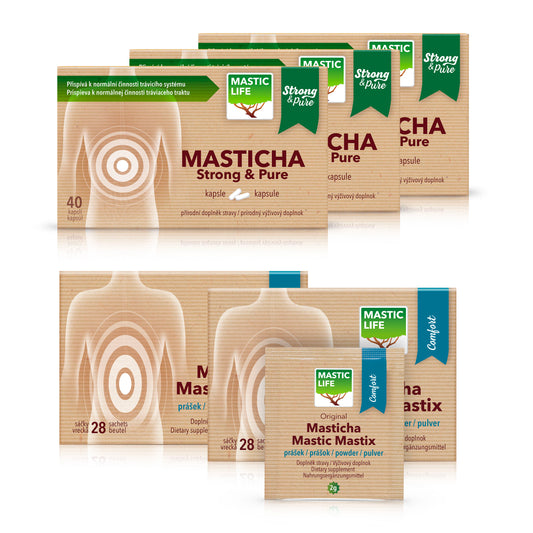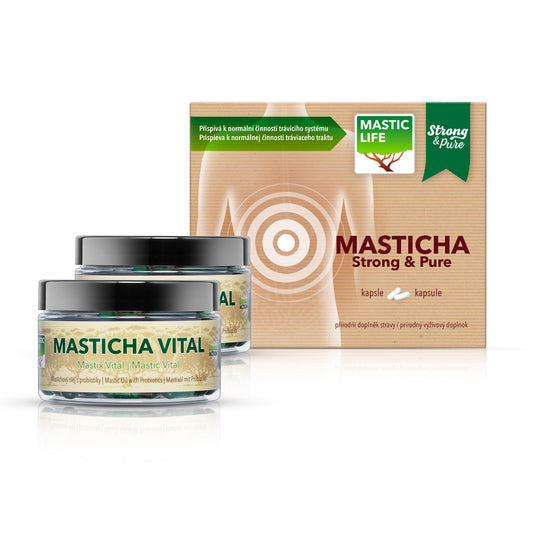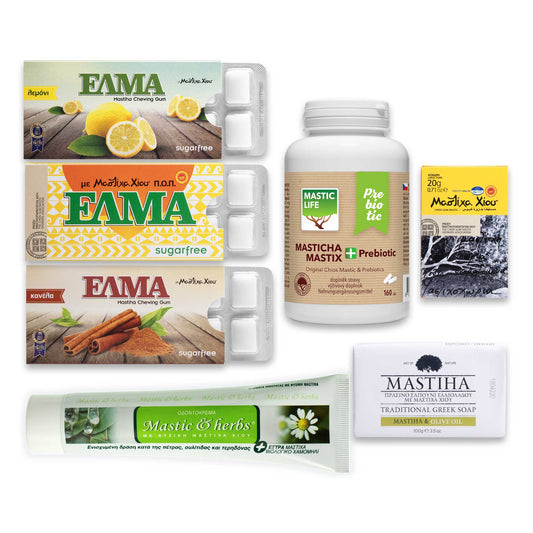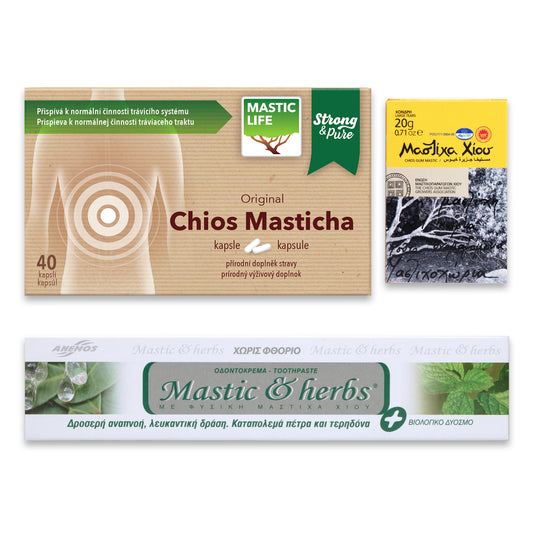What Home Remedies Help With Heartburn?
One too many glasses of wine, a stressful day or too rich a meal: There are many possible causes of heartburn. For those affected, it is important to know how to relieve the painful burning sensation as quickly and reliably as possible. In addition to medicines, simple home remedies can also be used. We have summarised for you which remedies can help against acute heartburn and other tips.
Overview: What Home Remedies Help With Heartburn?
- Home remedies for drinking
- Home remedies for eating
- Tips for the night
- Preventive measures
- Babies & children
FAQ about home remedies for heartburn
What home remedies help with heartburn?
There is a wide range of home remedies for heartburn - so you have to try out what helps you best. Teas that soothe the stomach, such as fennel, caraway or chamomile tea, have proven to be effective. Chewing gum can also help. The stimulated saliva flow neutralises small amounts of stomach acid in the oesophagus.
Is milk good for heartburn?
According to scientific opinion, milk does not help with heartburn.4 However, there are many sufferers who rely on the positive effect of this household remedy. It is assumed that this is due to a placebo effect.
Which tea soothes the stomach for heartburn?
Herbal teas with chamomile, caraway, yarrow or fennel, for example, can help with mild heartburn. They dilute the stomach acid and soothe the irritated mucous membranes in the stomach. Teas can also be used during pregnancy and breastfeeding.
What should you do if your baby has heartburn?
If babies suffer from heartburn, parents can try simple measures such as smaller meals or an upright position after feeding. For older children, be careful to avoid greasy, fried or spicy foods. Too much food can also upset the stomach. In addition, a glass of water or tea after a meal helps to dilute the stomach acid.
Home remedies for drinking: from milk to potato juice
From the tried-and-tested classic to the unusual-looking home remedy - anyone suffering from heartburn is spoilt for choice. Sufferers can resort to the following home remedies for drinking, among others:
- Baking soda
- Water and herbal teas
- Milk
- Healing earth
- Sauerkraut and potato juice
| Remedy / Tip | Description / Effect | Notes / Warnings | Pregnancy / Children |
|---|---|---|---|
| Baking soda | Neutralizes stomach acid | Risk of overdosing, belching, consult doctor if pregnant | Limited use |
| Water & herbal teas | Dilutes acid, soothes stomach | Black tea limited due to caffeine | Safe |
| Milk | Cooling placebo effect |
Not scientifically proven |
Moderate use |
| Healing clay | Absorbs excess stomach acid |
Avoid with medications, high aluminum content caution |
Generally safe, avoid high Al |
| Sauerkraut & potato juice | Regulate pH, buffer acid | Sauerkraut can cause flatulence | Safe |
Baking soda: Does the classic home remedy help against heartburn?
When you think of home remedies for heartburn, the first thing that probably comes to mind is good old sodium bicarbonate, or more precisely: sodium hydrogen carbonate. Even a little of it is supposed to neutralise the stomach acid and counteract heartburn in this way.
The application is very simple: Dissolve one teaspoon of baking soda in a large glass of still water. Then drink the liquid slowly and in small sips.
However, baking soda should not be used too often as a home remedy for heartburn. This is for these reasons, among others:
- Excess sodium bicarbonate is utilised by the body and is not simply excreted again. There is therefore a risk of overdosing, which can upset the body's pH value.1 This often results in stomach pain or diarrhoea.
- If the soda dissolves in the water, carbon dioxide is also formed. This is a gas that can cause increased belching in the stomach - similar to a glass of carbonated mineral water. Belching can increase the pressure on the sphincter between the oesophagus and the stomach.2 If the pressure is too great, the sphincter can give way, allowing stomach acid to rise more easily.
- During pregnancy and breastfeeding, women should consult their doctor before taking bicarbonate of soda. The reason: if taken frequently, this household remedy can affect the mineral and acid-base balance of the mother and the child. As a result, there may be an increased formation of carbon dioxide gas, which leads to acid regurgitation and flatulence.3
Good to know: Sodium bicarbonate in medicines
Some medicines for heartburn do contain sodium bicarbonate, but they are considered well tolerated when dosed and used correctly. Nevertheless, side effects such as belching, flatulence or abdominal pain can occasionally occur when taking the active ingredient. In rare cases, nausea, vomiting and diarrhoea are possible.
Dilute stomach acid with water and herbal teas
A proven home remedy for heartburn is drinking herbal teas. Heartburn occurs when acidic stomach contents enter the oesophagus and attack the sensitive mucous membrane.
Therefore, in some cases, drinking something will bring relief and thus move the acid back into the stomach. It also dilutes the excess stomach acid.
A glass of lukewarm, still water or low-acid tea such as chamomile or fennel tea is considered suitable. Black tea is only suitable to a limited extent, as the caffeine it contains can weaken the muscle between the stomach and the oesophagus.
Which tea helps with oesophagitis?
Inflammation of the oesophageal mucosa (oesophagitis) is often triggered by persistent reflux. Treatment is usually conservative - one possible way is to drink certain teas, for example with calamus root, yarrow and chamomile. These can support the healing of the oesophagitis. Alkaline powders or healing clay are also said to help.
Drinking milk against heartburn - (not) a suitable home remedy?
Besides bicarbonate of soda, milk is often cited as a home remedy for heartburn. However, its effect is also controversial. Science currently tends to conclude that a glass of cold milk does not help with heartburn.4
But why do so many people swear by this home remedy? Possibly there is a placebo effect: The cooling effect in the oesophagus and the belief that milk has proven its worth can provide relaxation and calm the stomach.
Help from the ice age: healing clay for heartburn
Healing clay is a fine rock powder extracted from glacial loess deposits and used for various applications - including mild heartburn and acid-related stomach pain. Like a sponge, the healing clay absorbs the excess stomach acid.
You can get healing clay at the pharmacy. It is dissolved in a glass of water or tea according to the package instructions and drunk in sips. There are no known side effects when using healing clay.5
However, the home remedy should not be taken immediately with other medicines, as active substances contained in it are partly neutralised. An interval of one hour is recommended.5
Healing clay - also for pregnant women?
So far, there are no restrictions regarding the use during pregnancy and breastfeeding. However, expectant and breastfeeding mothers should rather avoid healing clay with a high aluminium content. At an increased concentration, aluminium can pass on to the (unborn) child and developmental disorders of the brain or damage to the kidneys, liver or bones are possible.6
Sauerkraut and potato juice help with mild heartburn
These home remedies may seem a little unusual: Sauerkraut and potato juice are also said to help against the unpleasant burning sensation behind the breastbone. The former regulates the pH value in the stomach and thus alleviates mild discomfort.7 Eating sauerkraut can also help. Too much of it, however, can lead to flatulence.
Potato juice, on the other hand, acts as an alkaline buffer - preventing over-acidification of the body. The juice from raw potatoes also neutralises excess acid. There are no known side effects when taking potato juice, which is why this home remedy is also suitable for pregnant women.8
Home remedies for eating: Chewing gum, oatmeal and co.
Remedies for heartburn and reflux are not only available for drinking, but also for eating. The tips listed below are generally safe to use during pregnancy and breastfeeding.
- Chewing gum
- Almonds and nuts
- Oatmeal
- Linseed
- Mustard
| Remedy / Tip | Description / Effect | Notes / Warnings | Pregnancy / Children |
|---|---|---|---|
| Chewing gum | Stimulates saliva, neutralizes acid | Sugar content may affect teeth | Safe |
| Almonds / nuts | Chew to bind acid | Avoid peanuts | Safe |
| Oatmeal | Binds excess stomach acid |
Cook with water, add cinnamon /honey optional |
Safe |
| Linseed / flax | Protective mucilage layer for stomach & intestines | Drink plenty of fluids | Safe, consult before 34th week |
| Mustard |
May bind acid, anti-inflammatory |
Spicy mustard can worsen symptoms | Test carefully |
Chewing gum as a remedy for heartburn
A rather unusual home remedy for heartburn is chewing gum, because it stimulates the production of saliva. Saliva is slightly alkaline and can neutralise small amounts of stomach acid in the oesophagus. In addition, saliva dilutes the existing acid and takes it back towards the stomach when swallowing.
Good to know:
If you don't like chewing gum, you can use sweets or pastilles. They also stimulate saliva production. However, you should only use the sweets and co. moderately, as they often contain a lot of sugar - which in turn can promote tooth decay.
Neutralise stomach acid with almonds and nuts
To relieve mild heartburn, chew about 4 to 6 almonds, a few hazelnuts, cashews or sunflower seeds very small.7 This creates a liquid paste that can bind excess stomach acid. On the other hand, be cautious with peanuts, because they can even stimulate the formation of acid.
Soothe heartburn with oatmeal
Chewing oatmeal creates a porridge that is able to bind excess stomach acid. Alternatively, you can cook oatmeal or porridge and eat it.
For the basic recipe (1 serving) you need:
- About 40 to 50 grams of oatmeal
- 200 millilitres of liquid, preferably water
Mix the two together in a saucepan and cook for about 3 minutes. You can then refine the dish with cinnamon, honey or almonds.
Linseed (flax) - effective home remedy and superfood
If you eat flaxseed regularly, you will not only do something good for your stomach, but also for your intestines.
This food contains a large amount of mucilage, which acts like a protective layer on the mucous membranes of the oesophagus, stomach and intestines, protecting them from aggressive stomach acid. By the way, psyllium also has a similar effect.
Note for pregnant women
As linseed has a birth-supporting effect, it is often recommended from the 34th week of pregnancy.9 Taken regularly, it is said to promote labour and shorten the birth process. If the home remedy is used before then, it is advisable to consult your gynaecologist.
Flax seeds are best taken ground - then there are no limits to your imagination: whether as a topping in muesli or yoghurt, in a smoothie or on breakfast bread. However, it is important to drink plenty of fluids, as both linseed and psyllium bind liquids.
A hot helper for heartburn: mustard
Mustard for heartburn? Yes and no. On the one hand, the essential mustard oils contained in mustard are supposed to bind the stomach acid and have an anti-inflammatory effect on the mucous membrane of the stomach. On the other hand, there are also sufferers whose heartburn has increased with the intake of mustard. The reason for this is the spiciness, which can stimulate the formation of stomach acid.
The same applies here as with all home remedies: try it out! If you want to do this, take a teaspoon of not too spicy mustard after a meal.10
Tips for the night: Relieve heartburn at night with home remedies
Heartburn is often particularly annoying at night because it prevents sufferers from falling asleep. In addition, many find the burning sensation more painful at night than during the day - possibly because the distraction that is usually present during the day is missing. However, tried-and-tested home remedies such as chewing gum are not very practical in this situation, because they also keep you from getting a restful night's sleep.
| Remedy / Tip | Description / Effect | Notes / Warnings | Pregnancy / Children |
|---|---|---|---|
| Pillow elevation | Stomach below esophagus | Positional aid | Safe |
| Sleep on left side | Prevents acid reflux | Positional aid | Safe |
A few extra pillow
A good tip against heartburn at night is therefore: lie down so that the stomach is further down than the oesophagus. This makes it harder for the acidic contents of your stomach to get up into your oesophagus. It is often enough to use a few extra pillows or, if possible, to raise the slatted frame so that the upper body is elevated.
Sleep on the left side
You should also sleep on your left side. This way, the stomach, which is on the left side of the body, is lower than the oesophagus. The stomach acid then has a harder time rising.
Preventive measures: Heartburn? Prevention is the best home remedy
As with so many things, the same applies to heartburn: Prevention is better than cure. A few tips can reduce the risk of the painful burning sensation in the oesophagus.
| Remedy / Tip | Description / Effect | Notes / Warnings | Pregnancy / Children |
|---|---|---|---|
| Small meals | Reduce stomach strain | Eat several times per day | Safe |
| Avoid tight clothes | Reduce pressure on stomach | - | Safe |
| Avoid triggers | Coffee, alcohol, cigarettes | - | Safe |
|
Diet modifi-cation |
Gentle foods: wholemeal, potatoes, low-acid fruits |
- | Safe |
These include:
- Eating several small meals: It is better to eat several times throughout the day instead of large amounts at once. This puts less strain on the stomach.
- Don't wear tight clothes: They put pressure on the stomach and sometimes cause stomach acid to rise.
- Avoid stimulants (triggers): Coffee, alcohol and cigarettes can cause heartburn or make the symptoms worse and should therefore be avoided completely, if possible.
- In many cases, a change in diet can also reduce the frequency of heartburn. Sweet or fatty foods in particular are considered typical triggers. In this respect, there are certain foods such as wholemeal products, potatoes or low-acid fruit that are particularly gentle on the stomach.
Babies & children: Relieve heartburn
Even the youngest children can suffer from heartburn - and need help. Proven measures are, for example:
- Putting babies in an upright position after a meal
- Avoid tight clothing or tight nappies
- Reduce stress in everyday life
- Make sure they get enough exercise
- Avoid greasy, fried and spicy foods

Mastic for your gastrointestinal tract
-
 8-week treatment 🗓️
8-week treatment 🗓️Mastic 8 weeks
Regular price €78.00 EURRegular price€97.50 EURSale price €78.00 EURSale -
 60-day treatment 💪
60-day treatment 💪Mastic Gum Extra for 60 days
Regular price €139.00 EURRegular price€174.70 EURSale price €139.00 EURSale -
 Gift set 🎁
Gift set 🎁Mastic „Life with Mastic"
Regular price €58.00 EURRegular price€63.53 EURSale price €58.00 EURSale -
 Gift set 🌿
Gift set 🌿Mastic „Pure Mastic“
Regular price €29.90 EURRegular price€32.70 EURSale price €29.90 EURSale




